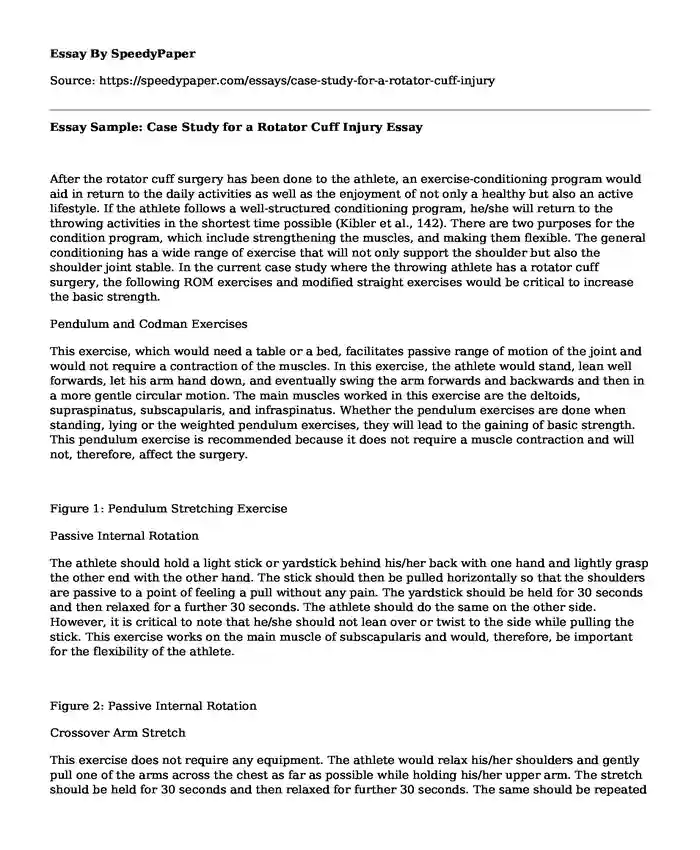
| Type of paper: | Essay |
| Categories: | Health and Social Care Medicine Sport Case study |
| Pages: | 3 |
| Wordcount: | 629 words |
After the rotator cuff surgery has been done to the athlete, an exercise-conditioning program would aid in return to the daily activities as well as the enjoyment of not only a healthy but also an active lifestyle. If the athlete follows a well-structured conditioning program, he/she will return to the throwing activities in the shortest time possible (Kibler et al., 142). There are two purposes for the condition program, which include strengthening the muscles, and making them flexible. The general conditioning has a wide range of exercise that will not only support the shoulder but also the shoulder joint stable. In the current case study where the throwing athlete has a rotator cuff surgery, the following ROM exercises and modified straight exercises would be critical to increase the basic strength.
Pendulum and Codman Exercises
This exercise, which would need a table or a bed, facilitates passive range of motion of the joint and would not require a contraction of the muscles. In this exercise, the athlete would stand, lean well forwards, let his arm hand down, and eventually swing the arm forwards and backwards and then in a more gentle circular motion. The main muscles worked in this exercise are the deltoids, supraspinatus, subscapularis, and infraspinatus. Whether the pendulum exercises are done when standing, lying or the weighted pendulum exercises, they will lead to the gaining of basic strength. This pendulum exercise is recommended because it does not require a muscle contraction and will not, therefore, affect the surgery.
Figure 1: Pendulum Stretching Exercise
Passive Internal Rotation
The athlete should hold a light stick or yardstick behind his/her back with one hand and lightly grasp the other end with the other hand. The stick should then be pulled horizontally so that the shoulders are passive to a point of feeling a pull without any pain. The yardstick should be held for 30 seconds and then relaxed for a further 30 seconds. The athlete should do the same on the other side. However, it is critical to note that he/she should not lean over or twist to the side while pulling the stick. This exercise works on the main muscle of subscapularis and would, therefore, be important for the flexibility of the athlete.
Figure 2: Passive Internal Rotation
Crossover Arm Stretch
This exercise does not require any equipment. The athlete would relax his/her shoulders and gently pull one of the arms across the chest as far as possible while holding his/her upper arm. The stretch should be held for 30 seconds and then relaxed for further 30 seconds. The same should be repeated with the other ar. This exercise should be done for 5-6 days per week. This exercise strengthens the posterior deltoid muscles and the athlete should, therefore, feel a stretch at the back of his/her shoulder. The choice of this ROM was informed by the need for the athlete to have flexible muscles for the sake of the throwing.
Figure 3: Crossover Arm Stretch Strengthening Exercise
Elbow Extension
The athlete would require different weights, which will be increased with time. He/she should stand tall with the weight being distributed over both feet. One arm should be raised and the elbow bent with the weight behind the head. The arm should be supported by placing the opposite hand on the upper arm. This will strengthen the triceps and hence make it easier for the athlete to throw. As such, it is recommended due to its effectiveness in strengthening the back of the arm.
Figure 4: Elbow Extension Exercise
Works cited
"Pendulum And Codman Exercises For Shoulder Rehabilitation". Healthline. N.p., 2016. Web. 7 Sept. 2016.
Kibler, W. Ben, et al. "The disabled throwing shoulder: spectrum of pathology10-year update." Arthroscopy: The Journal of Arthroscopic & Related Surgery 29.1 (2013): 141-161.
Cite this page
Essay Sample: Case Study for a Rotator Cuff Injury. (2019, Oct 28). Retrieved from https://speedypaper.com/essays/case-study-for-a-rotator-cuff-injury
Request Removal
If you are the original author of this essay and no longer wish to have it published on the SpeedyPaper website, please click below to request its removal:
- Free Essay in Education: Traditional and Online High School Classes
- Free Essay Example: Internet for Young People
- Free Essay Sample on the Evolution of Digital Art
- Free Essay about Drinking Alcohol during Pregnancy
- Free Essay Dedicated to California Community Foundation
- Free Essay Describing The United Kingdom Economy
- Covid-19's Global Impacts on Human Resource Management - Essay Sample
Popular categories




